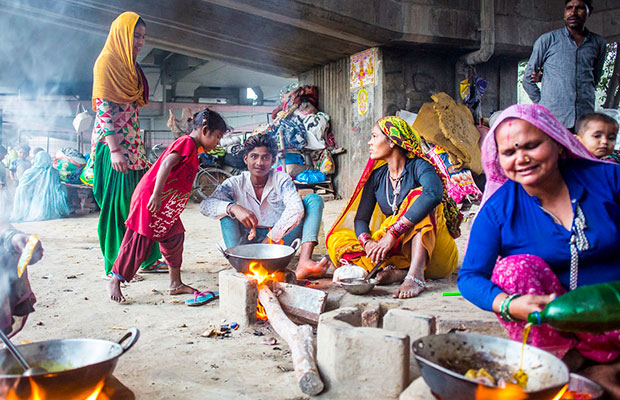
Breaking the Poverty Cycle for “Nowhere People”
If you ever wander the streets of India’s biggest cities, you’ll see them. They are the hard-working men, women and children who’ve built the luxury high-rise apartments, glitzy shopping malls, modern office complexes, and related infrastructure that have placed New Delhi, Mumbai, Kolkata, Chennai and other cities on the global stage of commerce and prestige. Then again … maybe you won’t see them at all.
Why? Because the developers and contractors who exploited them and paid them next to nothing would prefer not to broadcast that fact. Thousands of these workers—most of whom have migrated from their impoverished rural communities hundreds of miles away—live crammed in the hidden alleys and under highway overpasses of the beautiful city streets they’ve created.
“They live under tin sheets, in cramped quarters, without drinking water, toilets and light,” says Father Babu Varghese, a Salesian missionary who serves in New Delhi. “The sewage flows like a canal … garbage is strewn all over. This is the so-called thanks they receive after laboring for years” to build the lavish cities they’ve been excluded from enjoying.
Fr. Babu calls them the “nowhere people” of India. Unable to get back home to the places they migrated from (a situation made worse by the pandemic), and with no recognition or social support in the cities, they don’t belong anywhere or anyplace.
“The most affected are the children who live in this squalor and lose their childhood,” he says. “They are illiterate, malnourished, unhealthy and unaware of the wide world brimming with possibilities.” Without an education, many of these children will grow into unskilled young adults, and also end up as exploited construction workers.
“It’s a heartbreaking cycle of deprivation, poverty and despair,” says Father Gus Baek, director of Salesian Missions. “That’s why our missionaries across India are working to draw attention to this critical issue, and create programs and services to help migrant laborers break free from this path of despair.”
This requires a two-pronged approach: first, to support migrant workers where they are; and second, to improve conditions and opportunities in rural areas so residents don’t have to migrate to big cities at all—or, if they do, it’s to pursue advanced education.
With assistance from the Don Bosco Development Society in Mumbai, our missionaries are helping 400 poor families living in the Dharavi slum—perhaps Asia’s largest, most cramped makeshift community of nearly 850,000 people. Many of these families rely on construction-related day labor in order to eat and the pandemic has made conditions even worse. Missionaries distribute food and personal hygiene items, and have launched some initial education and training programs. They are also providing primary school education to 10 different villages located in the rural state of Rajasthan. Here, more than 300 girls and boys—most of whom are children of farm and quarry laborers—are building the foundations they need for better futures.
“These are just two of so many existing and planned initiatives our missionaries are leading throughout India’s cities and rural areas on behalf of its most marginalized citizens,” says Fr. Gus. “From proactive agricultural training that entices and prepares youth to choose sustainable farming for their livelihoods, to reactive humanitarian aid initiatives like free community food pantries for impoverished laborers, they are committed to helping India’s ‘nowhere people’ claim their deserved place in society.”
Our mission addresses the root causes of poverty and its effects, in order to improve the lives of some of the most marginalized children and families around the world. What’s your mission?
Learn more about our work in India.

